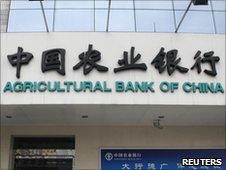Investors weigh up China bank options
- Published

The bank is floating on both the Hong Kong and Shanghai markets
It has not been a good year so far for Chinese investors.
The Shanghai stock market has lost 26% of its value since the start of the year - far more than most others across the globe.
One reason for the fall has been anticipation of a big event - the listing of the Agricultural Bank of China (AgBank) this month in Shanghai and Hong Kong.
The bank is selling at least 22 billion shares in Shanghai and 25 billion in Hong Kong. It has an option to increase those figures by 15% if the share offer is oversubscribed.
It is the last of the big four Chinese banks to hold an initial public offering (IPO) and it has sucked liquidity out of the markets both here and Hong Kong, as investors have sold stocks to raise the cash they needed to get a stake in the flotation.
Reports say that in Hong Kong, the shares have been priced for HK$3.20 each (41 US cents), the midpoint of the expected range, while in Shanghai, the shares are priced for 2.68 yuan (40 US cents), the top of the expected range.
If the extra 15% is taken up by underwriters, the issue will beat the previous record of $21.6 billion, set by the Industrial and Commercial Bank of China, four years ago.
'Low expectations'
In the Shanghai Hongyuan Stock Exchange - a private stock dealing firm - a huge room is filled with computer terminals.
Sitting behind them are investors - many of them retirees.
They come to keep an eye on their stocks, to trade, and to debate with each other the merits or otherwise of the shares on offer.
Lin Ming is in his fifties and retired. He has been coming to the exchange along with one of his neighbours, a fellow investor, ever since he left his job.
He says he is planning to buy shares in the AgBank "as long as the dividends it pays are higher than bank interest".
And he is convinced the bank is a good investment because it is state-owned.
"It has support from the state, as well as from government-owned funds," he says. "I'm not sure if the share price will soar or not, but I think it's very unlikely to fall below its opening price."
Li Guohong, who worked in finance before she retired, is more pessimistic about the AgBank's prospects.
"It has so many bad debts, accumulated over the past few years," she says. "I have low expectations".
'Popular'
Many commentators would agree with her. They describe the AgBank as the "weakest" of the big four banks in China.

The bank has a predominantly rural customer base
Its chairman, Xiang Junbo, a war hero before he was a banker, has worked hard to turn it around in recent years.
Two and a half years ago, more than a quarter of its loans were "non-performing" (in other words, the customers could not pay). It took time to transfer that bad debt to a government-backed asset management company.
Only now that these loans have been offloaded can the flotation go ahead.
AgBank is offering a 15% stake in its business to private and institutional investors, but this will not be the only opportunity to take a stake in a Chinese bank this year.
The banks need to raise billions of dollars from the stock markets in Shanghai and Hong Kong.
The government had ordered them to lend freely to help get businesses through the global financial crisis, but now its telling them to strengthen their balance sheets.
Some analysts that together they need to raise more than $74bn.
"These share issues have such a big effect on the markets because bank shares are popular and are seen as relatively safe, says Ken Peng, of Citibank in Beijing.
"They are attracting way more funds than are actually needed for the flotation, which is why you see the People's Bank of China [the Central Bank] needing to inject one trillion yuan ($147.6 billion) into the markets over the last few weeks just to maintain liquidity."
Slowdown risk
The question is whether the markets can absorb these demands for funds.

The Shanghai stock exchange is down sharply from its peak in August 2009
In recent weeks some other big IPOs have been shelved.
Swire Properties in Hong Kong, for example, abandoned a $2.7bn flotation in May citing deteriorating market conditions.
The draining of funds from the market ahead of the AgBank IPO is partly to blame although other factors such as the sovereign debt crisis in the Eurozone have not helped market sentiment.
Investors are not sure whether China's economy is sufficiently isolated or "decoupled" from the problems in the Eurozone.
The worry is that if markets here continue to fall, making it harder for Chinese banks to raise the funds they need in the coming months, they will have less money to pump into the economy, risking a slowdown in the recovery.
But not everyone believes this will happen.
PricewaterhouseCoopers has raised its prediction of funds likely to be raised through IPOs in Shanghai and Shenzhen (the two mainland China exchanges) this year to 500bn yuan.
The firm expects at least 300 new listing, making China the number one in the global flotation market, both in terms of the number of IPOs and the funds raised.
Hong Kong has seen an increase of 186% in funds raised by IPOs in the first six months of the year, compared to the same period in 2009.
"The China IPO market has picked up significantly… despite the uncertainties on global recovery and the Euro debt crisis" PwC's Frank Lyn said in a statement.
Excitement?
Chinese banks do not yet offer their customers the same kind of sophisticated financial products on offer in western economies.
So those with money to invest are left with the property market, now subject to tighter restrictions as the government tries to cool rising prices, and the stock markets.
The pricing of the AgBank shares, and their performance in the first few days and weeks of trading, will be watched closely by others planning IPOs in the second half of the year.
They will be looking for any indication of investor sentiment. Will there be excitement at the opportunity to invest in a major state-owned bank, whatever the concerns about its efficiency and profitability?
Or will fears about slowing growth here, the worry about the bad loans on AgBank's books and those of other banks and volatility in stock markets, lead investors to hang on to their cash and stay out of the market?
- Published7 July 2010
- Published2 July 2010
- Published30 June 2010
- Published21 June 2010
- Published9 June 2010